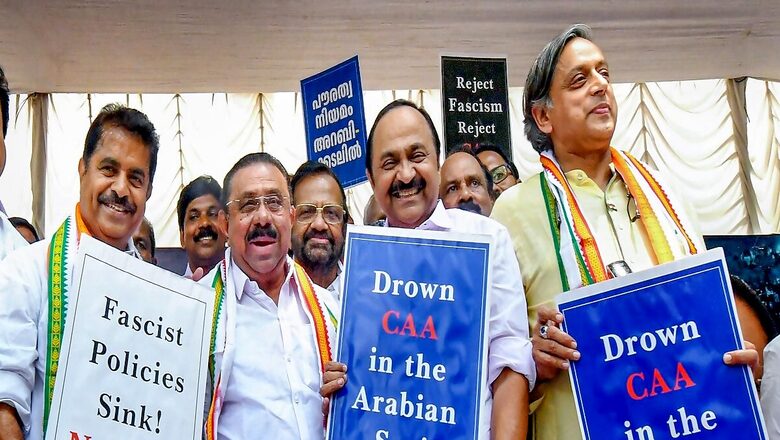
views
Indian politicians since the last seven decades after independence have been practising vote bank politics or Muslim appeasement. Vote bank politics, a term used in the political discourse of India, refers to a loyal bloc of voters from a single community who consistently back a certain candidate or political party in democratic elections. This behaviour is often the result of an expectation of benefits, whether real or imagined, from the political party, often at the cost of the other community.
The Indian National Congress (INC) has been known to indulge the Muslim pressure groups time and again, often at the cost of the rights of Muslim women. The Shah Bano landmark Supreme Court of India judgement overturned by the then PM Rajiv Gandhi, under the influence of Muslim politicians, academicians, intellectuals, and pressure groups is a glaring example of this Muslim appeasement. The term ‘vote bank politics’ was first used by noted Indian sociologist M. N. Srinivas in 1955. Today, it denotes voting based on, among other things, caste, sects, language, and religion and is usually used negatively.
Muslim pressure groups since the 1940s have been collectively bargaining for their demands and political aspirations and gave us (current 20 crore Muslims) the burdensome legacy of the Partition, a stigma we have not been able to live down. Ibn Khaldun Bharati is a well-known pseudonym of an upright, tax-paying citizen and son of India of Muslim heritage, who writes for The Print. In his article, ‘Why do Indian Muslims lack an intellectual class? For them, it’s politics first’ dated March 26, he wrote that according to the 1970s journalist Hamid Dalwai, there was a problem with the concept of a “Muslim intellectual”.
Khaldun Bharati points out Dalwai’s arguments that these individuals, who are supposed to represent the Muslim community in public debates and discussions, do not possess the qualities and characteristics typically associated with intellectuals. Dalwai had suggested that these individuals were primarily defined by their religious identity as Muslims, rather than their intellectual abilities or achievements. In other words, Dalwai believed that being a Muslim is the primary focus for these individuals, overshadowing their intellectual pursuits and capabilities.
Hamid Dalwai, the only towering intellectual the Indian Muslim community produced, was dubbed the angry young secularist from a small Maharashtrian village; until Arif Mohammad Khan and APJ Abdul Kalam came along. Dalwai also insightfully pointed out that this lack of intellectual capacity hindered the ability of Muslim “intellectuals” to effectively represent the Muslim community in public debates. As a result, the Hindu Left-Liberals often stepped in to represent the Muslims. While the Shah Bano fiasco was going on, Arif Mohammad Khan narrates, how PV Narasimha Rao advised Rajiv Gandhi to refrain from standing up for the poor lady and the Supreme Court’s iconic judgement, buckling under the threats of riots by the Muslim pressure groups, generally comprising the ulema, and regressive Muslim politicians and intellectuals.
Rao’s words to Rajiv Gandhi are a slap on our faces, “…if the Muslims do not want to modernise, why should we take up the burden and invite their wrath? (Arif M Khan’s paraphrase)”. This attitude is what has hindered the Indian Muslims from modernising in huge numbers and not just in pockets and individually. Rightfully too, the call for reform has to come from within and with numbers reaching a tipping point, which sadly is not the case yet.
Meanwhile, politicians like Arvind Kejriwal will keep mocking the ethnic cleansing of Kashmiri Pandits from the Valley due to Islamism, terming Pulwama as an inside job and Mamata Banerjee will keep going out of the way to protect gangster Sheikh Shahjahan who exploited Hindu women in Sandeshkhali. These politicians have no inkling, they are “useful infidels” for the Islamist Muslims and their vote bank politics is welcomed and celebrated. The grab for power to maintain their hold on the ‘kursi’, costs us victims of Muslim Personal Law and internal insurgencies like jihad and ISIS-related insidious terrorism.
Why do these appeasement politicians have to cater to the lumpen elements in the Muslim community? Why do policymakers, politicians, legal experts, think tanks and other agencies always bend to Muslim pressure groups? Why can’t they keep the Universal Declaration of Human Rights and the Indian Constitution as the moral compass and put their foot down for Muslim women and children? Scores of data, even the biased surveys from AMU, Jamia, etc point to the fact that the march of the Indian Muslims into the 21st century is being curtailed by the “Muslim intellectuals” and their insistence on our participation in the Olympics of oppression. And coerced victimhood.
These useful infidels forget that the Hindu majority has been bearing the brunt of Islamist aspirations, internal insurgencies, and terrorism for decades now, while the Muslim appeasement by Left-Liberals gaslights the Muslim women and children’s experiences under Sharia Law. Politics can’t be at the cost of one group. The Indian Muslims are still living in their past, reminiscing the glorious Mughal rule, and “sufficiently imagined” new Medinas such as Pakistan since the 1940s, while the Hindu community is desperately trying to become a ‘Vishwa Guru’, standing up to the bullying of developed countries, our former colonial masters. Those same former imperial powers leave no stone unturned to spread the disinformation of an alleged and imagined “ongoing Muslim genocide” in India.
What the useful infidel politicians need to understand is this: it costs women of Muslim heritage a lot. Be it the Shah Bano judgement of 1984, the recent Shayra Bano case of triple talaq, buckling under the ill-informed backlash of the CAA fiasco, because the Muslim pressure groups threatened Shaheen Bagh-like agitations or indulging Muslim academicians when they opposed the implementation of UCC on national TV. These threats seem to quadruple because of the Red-Green Alliance between Muslim communalists and useful infidels. Any chance of reforming the family laws, bringing in modern education, or streamlining the madrassas remains on paper only.
The rage of the Muslim male is often visible on the streets of India – the Delhi riots, the funeral gatherings of the barber who murdered children from Uttar Pradesh, or the gangster Mukhtar Ansari, or Yakub Menon or Kashmiri terrorists. In the ‘sar tan se juda’ rallies as well as the scores of videos coming out every day of Muslim punks or ulema warning the majority of dire consequences if and when the police force is removed. The useful infidels do not take into account what the Muslim male rage does behind closed doors, in ghettos and no-go areas. This rage, universal to poor war-torn Arab cities and towns, except when ruled by dictators, is now evident across European cities too, the same cities that provided refuge to fighting-age men (note- not many women or children made their way across the Mediterranean) who wanted “to escape wars back home”.
Useful infidels also do not see Muslim women missing from the political and legal scenes generally, but every time there is an attempt at reform, then those same women’s cases are weaponised as an attack on Islam. This scenario was familiar to Hamid Dalwai in his lifetime too. He should have been a champion of the Indian Muslims since he focused on the non-religious aspects of Islam and never criticised the religion itself. However, the Muslim opinion-making class saw his ideas as subversive because they challenged their politics of separatism and their claim to power (Ibn Khaldun Bharati article). This is equivalent to blasphemy, and we all know it is an unforgivable act in the Muslim world and the punishment for it is justified (wajib ul qatl). Therefore, hostility towards Dalwai from the Muslim community was because he was challenging and criticising the political privilege of the elite Muslims and the right to rule which Indian Muslims deem is more important than the religion itself.
So, these useful infidels need to take a good, hard look at their constituencies and include the victims of the male Muslim rage – the women, children, and enlightened rational men too, the queer, transgenders, atheists, agnostics, and victims of incest. Grabbing onto power (kursi) no matter what is the worst form of corruption. The photo ops at Iftar parties, the much-touted Amar Akbar Anthony Bollywoodian bhaichaara, fools no one these days. The tolerance is only from the Hindu side and the Muslims are not budging even an inch, conveniently gaslighting the silent majority within that wants co-existence and neighbourly ties with the majority.
It is high time the culture and practice of vote bank politics, or Muslim appeasement ends, otherwise, it is hypocrisy to accuse the majority of doing the same thing.
The author is a writer and an educationist from Srinagar. Views expressed in the above piece are personal and solely those of the author. They do not necessarily reflect News18’s views.















Comments
0 comment